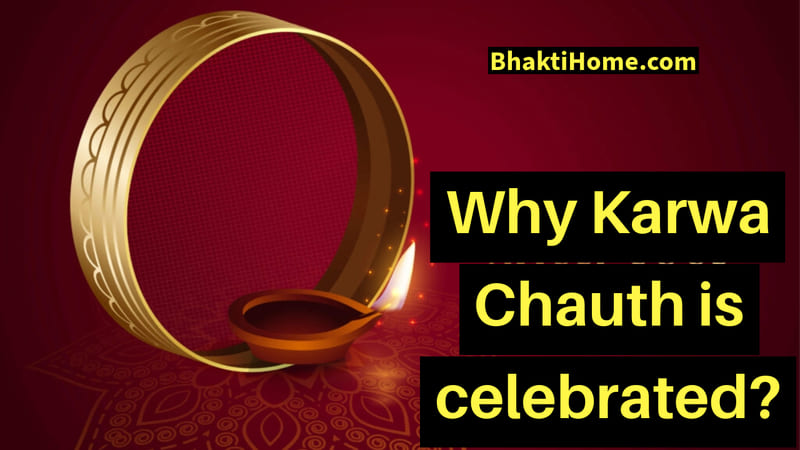
Karwa Chauth
Karwa Chauth, a sacred Hindu festival celebrated with immense enthusiasm, is a period of deep devotion and prayer, mainly practiced by married women.
Karwa Chauth also termed as Karaka Chaturthi or Karva Chauth, it falls on the Chaturthi tithi of Krishna Paksha in the month of Kartik. This festival centers around married women undertaking a demanding nirjala vrat, a fast without water and food, to seek the well-being and longevity of their husbands. They conclude the fast after the moon rises, observing the moon through a sieve and then looking at their husbands through it.
Why Karwa Chauth is celebrated?
Karwa Chauth, alternatively referred to as Karak Chaturthi, combines the words 'Karwa,' which signifies earthen pots, and 'Chauth,' denoting the fourth day. This alludes to the festival occurring on the fourth day of the dark fortnight, known as Krishna Paksha, in the month of Kartika celebrated with earthen pots (also referred as Karwa).
The celebration is rooted in the emulation of Goddess Parvati, who observed a fast to win the hand of Lord Shiva in marriage. Consequently, married women observe this fast to secure the well-being and enduring bond of matrimony with their husbands. This fast is also associated with the belief that it ushers in good fortune and prosperity for the family.
Karwa Chauth Celebration
Lets discuss Karwa Chauth Celebration in detail
Karwa Chauth Sargi and Its Timing
Sargi is a highly significant ritual during Karwa Chauth. Mothers-in-law prepare traditional dishes and offer a special Sargi thali to their daughters-in-law. One of the key dishes in this thali is Feni, a vermicelli pudding, which is consumed before sunrise.
Fasting Guidelines
For those planning to observe a full-day fast, it's recommended to consume Sargi between 3-4 AM or before sunrise on the Chaturthi Tithi (Chaturthi date). These customs and their significance underscore the sacred and affectionate bond between mother and daughter-in-law. Parents often buy gifts and sweets for their recently married daughters.
Puja Thali and Rituals
The Puja thali is decorated to symbolize a happy married life. Pregnant women and those who are unwell are usually advised not to fast. Some women wear new red attire, symbolizing marital bliss. Celebrations may include narrating folk tales, reading stories during the fast, and singing folk songs to add liveliness to the occasion. The fast is broken in the evening after catching a glimpse of the moon. Shopping for new items adds vibrancy to the festival, and markets are beautifully decorated.
Worship of Goddess Parvathi
Another common ritual is the worship of Goddess Parvathi, the consort of Lord Shiva. An elderly woman in the family narrates didactic stories related to Hindu gods before breaking the fast. Stories have always been an engaging way to convey the principles followed by Hindus.
Rich Cultural Heritage
Hindu festivals are a true expression of the rich cultural heritage dating back to ancient times. These celebrations during the Karwa Chauth festival create lifelong memories and leave a lasting impression on those who observe the fast. Markets are filled with colorful pooja items, decorated thalis, and idols of Goddess Parvati. The puja plate is adorned with new, glittering cloth pieces and gota patti. North Indian sweets like fenia, common dry fruits, matthi, and kheer are beautifully arranged on this plate.
Community and Rituals
Neighbours and family members come together for evening rituals. The idol of Goddess Parvathi is worshipped, and the significance of Karwa Chauth (Karwa Chauth Mahatamya) is narrated during this occasion. Women pass pooja thalis in a circle while chanting holy hymns. They eagerly await the moonrise, during which they light diyas and offer clay pots filled with milk, water, and coins as offerings. Arghya to the moon is presented using Karwas (pots), and they view the moon through a round sieve. The same sieve is used to gaze at their husbands and pray for their long life. The fast is concluded when the husband offers the first sip of water and food, followed by a grand feast.
Karwa Chauth Stories
Let's discuss Karwa Chauth Stories.
Story of Veervati
One well-known legend revolves around a beautiful lady named Veervati. Veervati was the only sister among seven beloved brothers.
Her first Karwa Chauth was celebrated at her parents' house, and she observed the fast. Learning of her fast, her brothers were deeply distressed.
Despite their pleas, she resisted breaking the fast. To trick her, they placed a mirror on a Pipal tree, resembling a moon. Veervati mistook it for the real moon and broke her fast. Tragically, news arrived that her husband, the king, had passed away just before she could break the fast.
Upon discovering the trick, Veeravati made a solemn commitment to observe the fast with unwavering devotion every month. She fervently prayed to the deities. Eventually, her steadfastness bore fruit, and in the end, her husband returned to her.
Mahabharata Story: Draupadi's Karwa Chauth Fast
Another significant story comes from the Mahabharata, where Draupadi observed the Karwa Chauth fast to ensure the safety and longevity of her husbands. The narrative goes like this: When the Pandavas faced numerous challenges during Arjuna's absence due to his penance, Draupadi turned to Lord Krishna for guidance. Krishna recounted the story of Goddess Parvati and her fast for Lord Shiva during a similar difficult situation. This inspired Draupadi to observe the Karwa Chauth fast with all the associated rituals. It is believed that her fast played a vital role in resolving the issues faced by the Pandavas.
The Tale of Karwa (Karva)
In this story, a devoted wife named Karwa (Karva) is featured. Her husband was seized by a crocodile while bathing in a river. To save her husband, Karwa bravely tied the crocodile with a cotton yarn.
She beseeched Yamaraja, the God of death, to condemn the creature to hell. Initially, Yamaraja refused, but Karwa's determination led her to threaten Yamaraja with a curse.
Faced with no other option, he sent the crocodile to hell and blessed Karwa's husband with a long and prosperous life.

